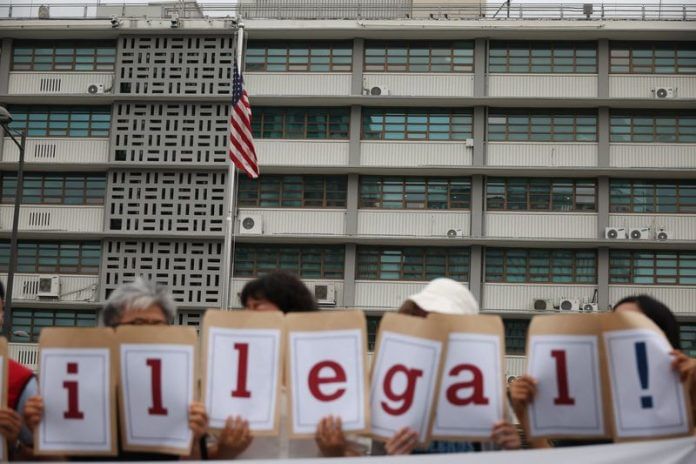By Ju-min Park and Jack Kim
SEOUL (Reuters) – South Korea will send a chartered plane to Atlanta as early as Wednesday to bring back workers detained in a huge immigration raid last week on a car battery plant in the U.S. state of Georgia, a Korean Air spokesperson said on Tuesday.
President Lee Jae Myung said Seoul would negotiate with Washington to achieve a reasonable resolution to the situation based on the spirit of their alliance, adding at a cabinet meeting that he felt a “heavy responsibility” for the detained nationals.
A Korean Air Boeing 747-8i plane with 368 seats will fly from South Korea’s Incheon to Atlanta, the airline spokesperson said.
During the U.S. immigration raid about 300 South Koreans were arrested along with 175 others at the site of the $4.3 billion Hyundai Motor and LG Energy Solution project to build batteries for electric cars.
South Korean Foreign Minister Cho Hyun is in Washington to negotiate on points such as seeking assurances that the Koreans returned home will be allowed to re-enter the United States.
White House spokeswoman Karoline Leavitt referred questions to the U.S. Department of Homeland Security and the U.S. Department of Commerce, saying they were handling the matter.
Assistant DHS Secretary Tricia McLaughlin, in a statement, gave no details on the ongoing probe or talks but defended the raid: “Those who exploit our workforce, undermine our economy, and violate federal laws will be held accountable.”
Representatives for Commerce could not be immediately reached.
Over the weekend, U.S. President Donald Trump said foreign companies must hire and train American workers while respecting immigration laws.
“Americans need these jobs. But he also understands the need for these companies to bring over their workers who already have these skills,” Leavitt told reporters at a briefing, calling Trump’s approach “very nuanced and responsible and sensible.”
The raid – the largest single-site enforcement operation in the history of the Department of Homeland Security’s investigative operations – sent shockwaves through South Korea, a U.S. ally that has been trying to finalise a trade deal agreed with Washington in July.
A Realmeter opinion poll published on Tuesday showed that nearly 60% of South Koreans felt disappointed by what they viewed as excessive action by U.S. authorities in the raid, while about 30% regarded the action as unavoidable.
Two Japanese nationals and up to nine Chinese citizens were among the detainees, the Nikkei business daily reported.
Details on how U.S. immigration rules may have been breached have not been released by the authorities or companies involved, but South Korean lawmakers say some may have overstepped the boundaries of a 90-day visa-waiver programme or a B-1 temporary business visa.
Foreign Minister Cho said he would discuss with Washington creating a special work permit for Korean professionals.
Korean businesses have complained about what they consider strict U.S. limits on visas for skilled foreign workers, making it difficult for them to oversee the construction of factories or to train the local workforce.
According to workers, officials and lawyers, many South Korean workers were sent to the U.S. on questionable documents despite their misgivings and warnings about stricter U.S. immigration enforcement.
James Rim, who heads the Korean-American Association of Southeast Georgia and runs guesthouses used by Korean workers near the Hyundai plant, said two of his residents were detained after being found to be on a visa-waiver programme that prohibits employment in the country while two others returned after screening during the raid.
Some of the 20 subcontractors working at the plant and staying at his guesthouse had returned to South Korea early, he said after the raid, adding that some of the workers were on a visa waiver, which had long been a standard practice.
“It should have been done earlier, but I think now is a good chance to give some kind of a special work permit to Koreans. Otherwise, it would be difficult to build factories only with a local workforce,” he said.
(Reporting by Ju-min Park and Jack Kim in Seoul and Jeff Mason, Ted Hesson and David Shepardson in Washington; Additional reporting by Susan Heavey; Editing by Ed Davies, Hugh Lawson and Daniel Wallis)
Disclaimer: This report is auto generated from the Reuters news service. ThePrint holds no responsibility for its content.




